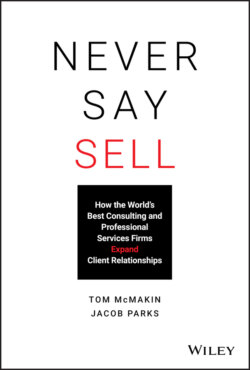Читать книгу Never Say Sell - Tom McMakin - Страница 7
Why We Never Say Sell
ОглавлениеWalt Shill looked around the room at his client team. He had gathered them from far reaches of the globe to review Accenture's previous year's work with a major client with an eye for how they might increase their mandate over the next year. As they reviewed the different elements of the business that could benefit from Accenture's skillset, a handful of suggestions were made by team members with a deep understanding of this client's business model (supply chain optimization, back-office centralization, and a new technology for budgeting, to name a few) when, abruptly, the brainstorming was interrupted by one member of the team who said, “What are we doing here? We don't want to be ambulance chasers!”
Shill, a passionate man, erupted.
“What are you talking about? We are the fucking ambulance! If you don't think we can help people and that we can add value, then you need to look for another job. We have a moral obligation to use our skills to solve their problems.”
Our observation, after a collective 50-plus years in expert services, is that there is a strong correlation between expert services and aversion to what is perceived as selling. Interestingly, it seems to grow stronger as you move into job descriptions that require unique degrees or certifications, such as the legal or accounting professions. A photo on a bus bench might be effective for a realtor, but it would be unimaginable for a top-tier attorney. Somehow, we think if we are good, the world should beat a path to our door. But the truth is that experts should feel a moral obligation to assist clients in need: We should be the ambulance when our clients need help.
